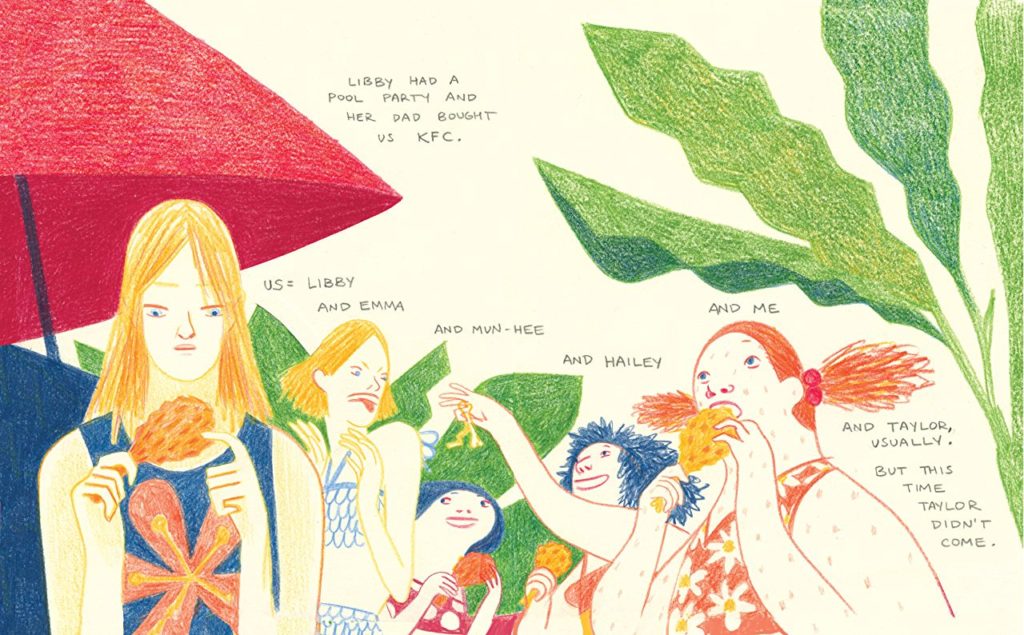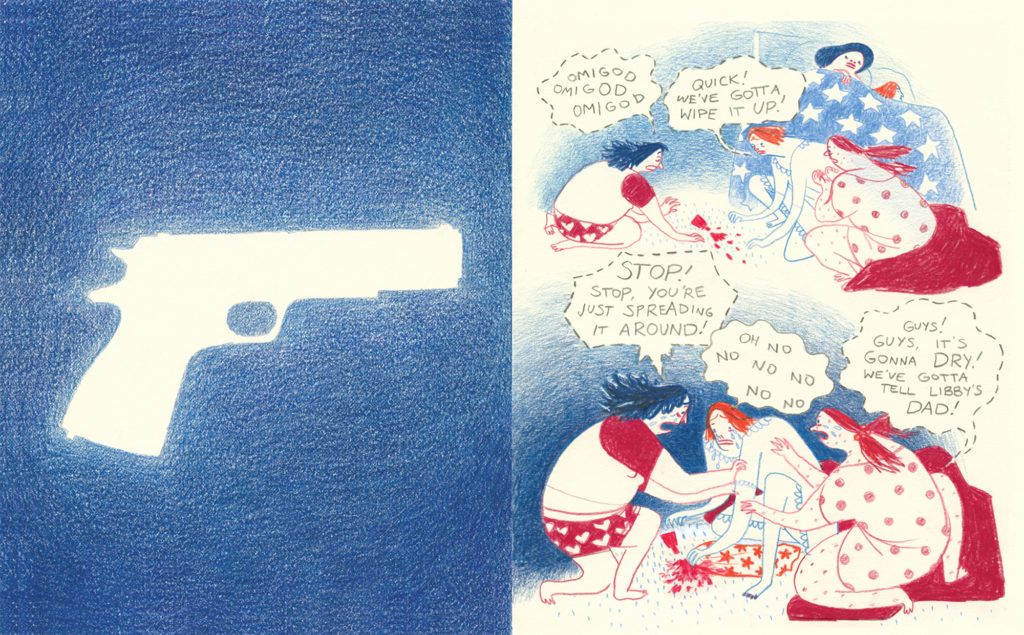
If there’s one comic this year that’s taken me the greatest number of readings to fully process, it’s Libby’s Dad by the incomparable Eleanor Davis, which technically came off the presses in late 2016 as part of the monthly co-publishing venture between Box Brown’s Retrofit Comics and Big Planet Comics, but didn’t reach subscribers’ eager hands until January, so hey — that makes it a 2017 release in my book, regardless of what the copyright indicia says. Beyond that admittedly arbitrary judgment, though, firm decisions are a tricky thing to come by in regards to this book.
Don’t get me wrong: I knew the minute I finished reading it that first time that I liked it a lot, and in some respects it’s sort of a shame that it’s now viewed as something of a “stop-gap” release between Davis’ much-lauded Fantagraphics collection, How To Be Happy, and her extraordinary travel memoir, You & A Bike & A Road published just a couple months ago by Koyama Press, because there’s a tremendous amount of thematic and conceptual density on offer here for a short, 40-page “graphic novella” that, in fairness, can be read in all of about ten minutes, but it’s one of those comics where there are not only “no easy answers,” there aren’t even any right or wrong answers — probably because there aren’t any answers on offer at all.

Deceptive simplicity, and the false sense of complacency it tends to necessarily engender, is the order of the day here — five pre-teen girls are having a pool/slumber party at the home of, well, Libby’s Dad, a newly-divorced guy who’s obviously doing the whole mid-life-crisis thing up big. He’s got the fancy new house with a pool going for him, and chances are pretty good that there’s a sports car in the garage, too. He’s clearly trying to impress his daughter’s friends by ordering them KFC (ubiquitous product placement, and the concomitant de facto critique of consumerism it implies, being something of a mainstay in Davis’ work) and cake (even though it’s no one’s birthday), but he may not be the “cool older dude” he seems: the girls have one other member of their group who’s notably absent because she’s been spreading a rumor around school — one that’s no doubt also made its way around the bleak cul-de-sacs of whatever interchangeable soul-dead suburb they all inhabit — that this apparently-nice guy who buys fried chicken and dessert for his daughter’s friends pulled a gun on his ex-wife and threatened to kill her. There may even be some circumstantial “evidence” to support this whispered-about scandal given that one of the girls saw Libby’s mom at the supermarket the other day quietly sobbing and standing frozen in place in front of the Fruit By The Foot boxes (again with the product placement).

The child’s-eye-view of adult situations may be overdone across the media landscape by now, but when handled skillfully — as it no doubt is here — it can still be equal parts relatable and revelatory: after all, we all remember what it was like to be a kid, but the way they interpret things and arrive at what passes for “understanding” often seems heartbreakingly naive to the adult mind. When you throw in guns and implications of domestic unrest, maybe even violence? Well, there really are some things that children, in an ideal world, shouldn’t have to think about — but think (and talk) about it they all most certainly do in these pages, especially when one of them spills nail polish on the carpet, and they immediately fear that the worst is about to happen.

Davis’ flowing, un-paneled page layouts and strong, highly-resonant colors (the entire book looks like it was drawn with colored pencils although I’m assuming it’s a digital approximation thereof) communicate both “light” and “dark” scenes with equal visual efficacy, and about 90% of the “information” imparted in Libby’s Dad has precisely fuck-all to do with what’s in the word balloons and box-free captions. In true child-like fashion, this is a story that is perhaps best felt and absorbed rather than strictly understood. After all, the idea that Libby’s nameless father is going to come in and shoot everyone dead over some stained carpeting is nuts, but in the highly insular context that Davis’ illustration and achingly authentic dialogue establishes, the dread that the girls feel, at the very least, makes perfect sense.
It’s probably not much of a “spoiler” if I go ahead and reveal that the old man doesn’t kill anybody — in fact, he’s pretty mellow about the whole thing and cleans up the mess in just a few seconds without so much as raising his voice or seeming even the slightest bit annoyed. As far as the girls are concerned, he’s obviously a pretty great dad. They were just jumping to silly conclusions, right?
Well, maybe — kids will do that, after all. But maybe not. Davis’ last page here (which I absolutely won’t “spoil”) is a quiet but firm gut-punch, and underlines the casual insensitivity, even cruelty, that children are capable of — one that’s frankly even unintentional given their limited, and by and large self-centered, view of the world. I’ll say no more, but as far as final images go it’s stark, unsettling, and absolutely demolishes any notions one may harbor about this being a story filtered through nostalgia’s rose-tinted lenses. This is some real shit. As real as it gets.
And my “buy” recommendation for Libby’s Dad is as strong at it gets. Yes, I said at the outset that it only takes about ten minutes to read from cover to cover, but you’re going to get your eight bucks’ worth (and then some) out of this book by poring over it for hours later. To bastardize a Dan Clowes title, Eleanor Davis is definitely packing an iron fist inside a velvet glove with this one.
Tags: art, Big Planet Comics, Box Brown, Comic Books, Comics, Eleanor Davis, Fantagraphics, Koyama Press, Retrofit Comics




No Comments